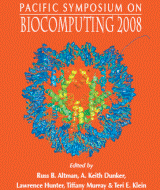System-Wide Peripheral Biomarker Discovery Using Information Theory
Gil Alterovitz1, Michael Xiang2, Jonathan Liu3, Amelia Chang4, Marco F. Ramoni5
1 Division of Health Sciences and Technology, Harvard University/Massachusetts Institute
of Technology, Cambridge, MA. Children's Hospital Informatics Program, Boston, MA
02115, USA. Department of Electrical Engineering and Computer Science, Cambridge,
MA 02139, USA. Harvard Partners Center for Genetics and Genomics, Harvard; 2 Division of Health Sciences and Technology, Harvard University/Massachusetts Institute
of Technology, Cambridge, MA 02139, USA. 3 Department of Biology, Massachusetts Institute of Technology, Cambridge, MA 02139,
USA. 4 Harvard Partners Center for Genetics and Genomics, Harvard Medical School, Boston
02115, USA 5
Children's Hospital Informatics Program, Boston, MA 02115, USA. Division of Health
Sciences and Technology, Harvard University/Massachusetts Institute of Technology,
Cambridge, MA. Harvard Partners Center for Genetics and Genomics, Harvard Medical
School, Boston 02115, USA.
Pac Symp Biocomput. 2008;:231-242.

Abstract
The identification of reliable peripheral biomarkers for clinical diagnosis, patient prognosis, and biological functional studies would allow for access to biological information currently available only through invasive methods. Traditional approaches have so far considered aspects of tissues and biofluid markers independently. Here we introduce an information theoretic framework for biomarker discovery, integrating biofluid and tissue information. This allows us to identify tissue information in peripheral biofluids.
[Full-Text PDF] [PSB Home Page]